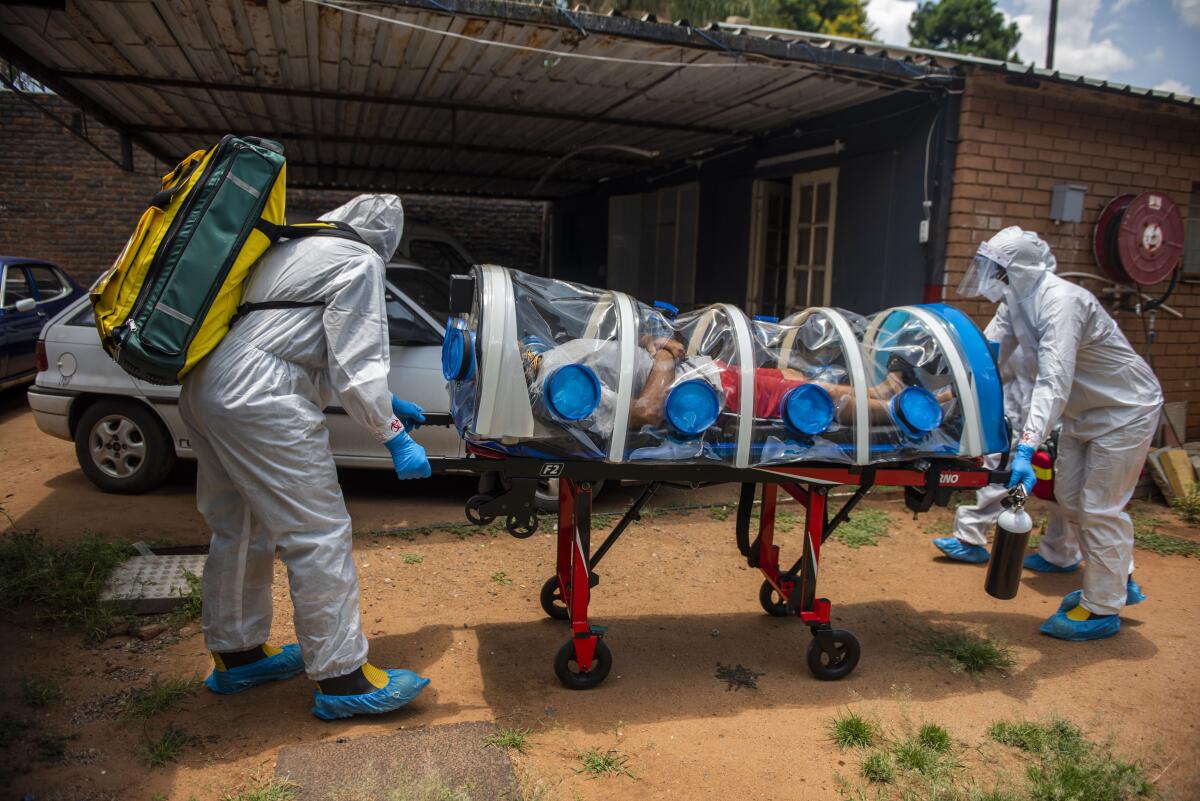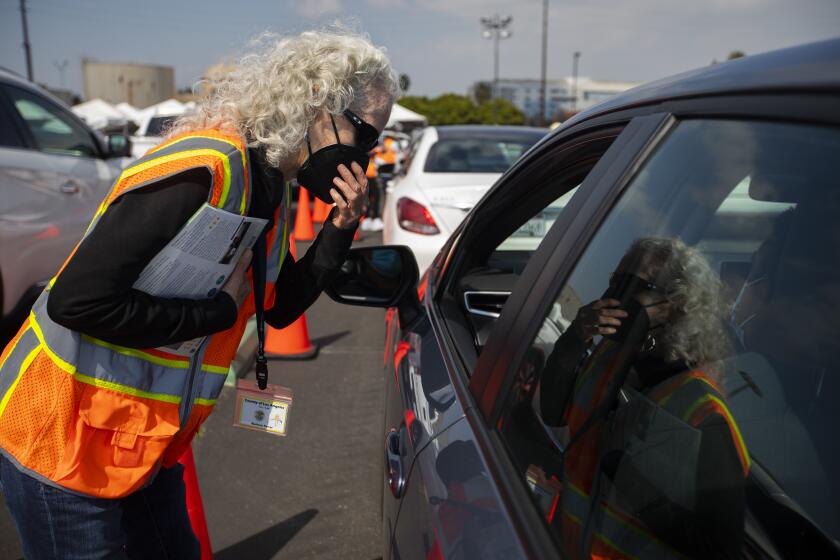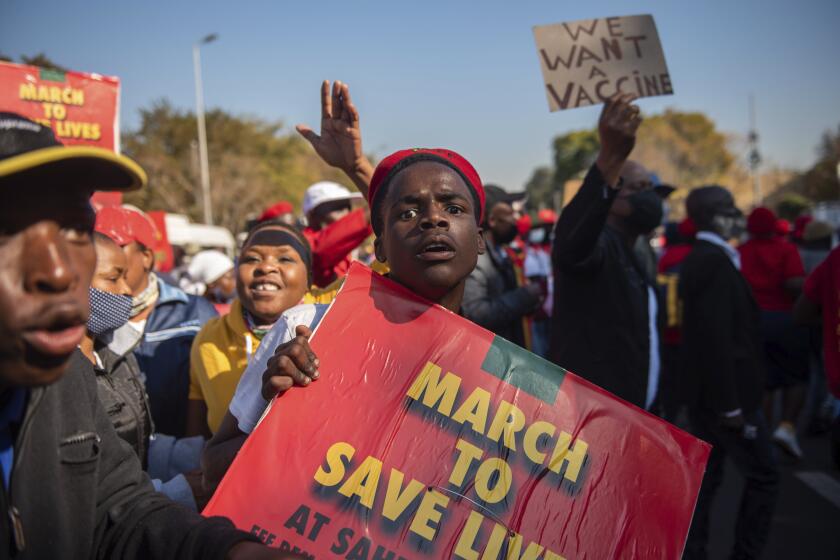South Africa announces sweeping coronavirus rules in face of variant-driven third wave

- Share via
South Africa is imposing a sweeping set of new coronavirus restrictions as the country faces a third, variant-driven wave of infection that threatens to outpace the previous two.
“We are in the grip of a devastating wave that by all indications seems like it will be worse than those that have preceded it,” President Cyril Ramaphosa said Sunday in an address to the nation. “The peak of this third wave looks set to be higher than the previous two waves.”
The Delta variant, first discovered in India, appears to be driving South Africa’s new increase, Ramaphosa said. The country recorded more than 15,000 new coronavirus cases Sunday, including 122 deaths, bringing its total fatalities to nearly 60,000.
As of Monday, all indoor and outdoor gatherings in the country are prohibited. Funerals and cremations will be limited to 50 people, and memorials after funeral gatherings are banned. All nonessential establishments will be required to close by 8 p.m., rather than the current curfew of 10 p.m., and an 11 p.m. nighttime curfew will be extended to 9 p.m., expiring at 4 a.m. each morning.
Restaurants will be limited to takeout or delivery. All alcohol sales, whether for on- or off-site consumption, will be suspended.
“Our ministerial advisory committee has advised that the limited restrictions that we previously imposed were not that effective and that a prohibition will ease the pressure that is placed on hospital services by alcohol-related emergency incidents,” Ramaphosa said.
All leisure travel in and out of Gauteng province, which now accounts for about 60% of the country’s new cases, will be banned, he said. Visits to nursing homes and other congregant settings will be restricted. Gauteng is the most populous province and includes Johannesburg and Pretoria.
Schools and other educational institutions will close for the winter holidays early, starting Wednesday; all schools will be expected to close by Friday, Ramaphosa said.
The restrictions will remain in place for 14 days, at which time they’ll be re-evaluated, Ramaphosa said.
California is contending with what could be the most contagious coronavirus variant to date, prompting officials to warn that residents face significant risk if they are not vaccinated.
South Africa first returned to stricter measures in late May as infections rose in some areas. Officials sought to head off a full-blown third wave by limiting attendance at social gatherings and putting in place a business curfew.
But since then, conditions only deteriorated, Ramaphosa said.
“What we are seeing is that the existing containment measures in place are not enough, are not enough to cope with the speed and the scale of the infections that we are experiencing under this third wave,” he said.
As of Sunday, the national seven-day average of new cases had already overtaken the peak of the first wave in July and was nearing the peak of the second wave in January, Ramaphosa said. He said it’s also possible the third wave could last longer than the first, which was 15 weeks, and the second, which persisted for nine weeks.
The resurgence is being driven by the rapid spread of the Delta variant, which was first detected in India in March and has now been identified in 85 countries, including five of South Africa’s provinces, Ramaphosa said.
“The evidence we have is that the Delta variant is rapidly displacing the beta variant, which has been dominant in our country until now,” Ramaphosa said.
Although preliminary data suggest the variant doesn’t cause more severe illness than other variants, it is thought to be up to twice as transmissible, meaning more people are likely to become ill and need hospital treatment, he said. Emerging evidence also indicates that people previously infected with the beta variant don’t have full protection against the delta variant and may become reinfected, he said. And it may also be more likely to cause illness in children, although their overall infection rates still remain substantially lower than those of adults, he said.
“Because it is much more contagious, the measures we have so far adopted to contain the spread of the virus may no longer be sufficient to reduce transmission,” Ramaphosa said.
The additional restrictions are necessary to safeguard the country’s health facilities, where intensive care beds are already in short supply, he said.
A rapid resurgence of COVID-19 is slamming South Africa’s largest city, Johannesburg, and threatens to overwhelm its hospitals.
Ramaphosa also called for everyone to continue wearing masks, which are mandatory in public spaces, and said employers must allow staff to work from home and postpone all nonessential travel and workplace gatherings.
The return to stricter measures comes as South Africa faces criticism for its sluggish vaccine rollout, which likely contributed to the resurgence. Ramaphosa said Sunday that the program was rapidly picking up pace, with nearly 2.7 million of the country’s roughly 60 million residents receiving at least one dose.
South Africa recently received 1.4 million doses of the Pfizer vaccine and 1.2 million doses of the Johnson & Johnson vaccine, he said.
The Associated Press contributed to this report.
More to Read
Sign up for Essential California
The most important California stories and recommendations in your inbox every morning.
You may occasionally receive promotional content from the Los Angeles Times.













